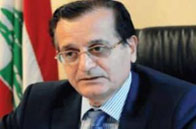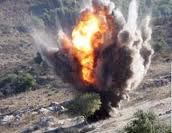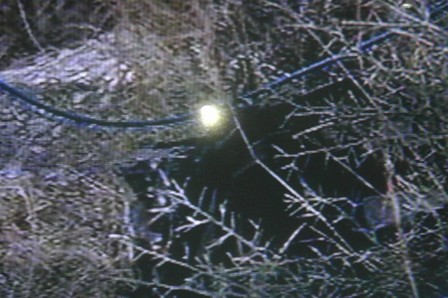
Shibaa For Hizbullah Arms...??? Not So Fast

Source: Al-Manar TV-19-06-2008
The Global Research in International Affairs Center, IDC Hertzilia described in an analytical report ‘Israel's' announcement of a willingness for peace talks with Lebanon is one of the early fruits of US Secretary of State Condoleezza Rice's recent visit to the region and her unexpected visit to Lebanon.
Lebanon, however, rejected any negotiations with ‘Israel', emphasizing that Lebanese territories occupied by the Jewish state are subject to U.N. resolutions that do not require any talks.
A statement released by the press office of Prime Minister designate Fouad said "Lebanon did not receive any message from any side through U.S. Secretary of State Condoleezza Rice."
"There is no room for bilateral negotiations between Lebanon and ‘Israel' and Lebanon's declared stand, reiterated last week, is commitment to the Arab peace initiative that calls for comprehensive and just peace," the statement stressed.
"‘Israel' is obliged to withdraw from Lebanese territories ... in line with UNSCR 425 and 1701," the statement noted.
According to the IDC Hertzilia report, the US is keen to bolster the position of Lebanese Prime Minister Fouad Saniora and the March 14 movement of which he is a part, in the wake of the recent Doha agreement.
"The Cedar Revolution, and the Saniora government which resulted from it, is considered by the US administration to be one of its most significant diplomatic achievements in the region," the reported posted on the Jerusalem Post said.
THE OCCUPIED SHIBAA FARMS ISSUE
Rice, in Beirut, expressed her concern at Hizbullah's prominence in Lebanon and said that the administration intended to address the "real reasons and underlying causes" of this. When asked to define these, she said that the issue of the Shibaa farms must be resolved within the context of UN Security Council Resolution 1701 rather than Resolution 425."
From the ‘Israeli' point of view, UNSC Resolution 425 appeared to close the issue of the Shibaa farms, since the UN Security Council ruled under Resolution 1310 that "‘Israel' was in full accordance with this resolution after its May 2000 withdrawal to the Blue Line", adopted in 2000.
Resolution 1701, meanwhile, adopted after the 2006 Second Lebanon War, implicitly reopened the matter by taking "due note" of Saniora's seven-point plan, which asks for the Shibaa farms to be placed under UN jurisdiction.
"The US administration wants to bolster Saniora and simultaneously remove the rationale for Hizbullah's continued bearing of arms and enable Saniora to pose as the "liberator" of Shibaa," the authors of the report analyzed.
However, analysts also maintain that the idea is likely to backfire.
"First of all, while Hizbullah has declared itself opposed to the idea of placing the Shibaa farms under UN jurisdiction, this will not prevent it from declaring any ‘Israeli' withdrawal as its own achievement, a delayed result of the shock and fear - and subsequent flexibility - induced in ‘Israel' by the 2006 war.
There is no reason to assume that this version will be any less credible than that offered by Saniora. This is particularly so because the call for the "return" of the Shibaa farms is associated with Hizbullah and was picked up by other elements in Lebanon only later.
Also, Hizbullah will claim that ‘Israeli' concessions on this issue are proof positive of the successful application of violence against ‘Israel', since the international community declared the matter closed in 2000 and then reopened it as a result of the war of 2006. Such a path is also unlikely to lead to Hizbullah's disarmament. Hizbullah is, after all, both a local Lebanese actor and a client and creation of Iran."
The report considers that should the occupied Shibaa Farms be ceded, Hizbullah already has another list against ‘Israel' that will be used to justify further "resistance."
"These include the seven villages that existed in the Galilee prior to 1948, and the large Palestinian refugee presence in Lebanon. The movement has indeed already issued a statement saying that "anyone who believes that placing [the] Shibaa farms under UN mandate will mean eliminating the rationale behind our resistance is mistaken.""
The analytical report concluded that the US and France want to strengthen their partner in Lebanon. "They want to show that aligning with the West brings results, while the allies of Iran are the forces determined to prevent tranquility. For the reasons cited above, reopening the issue of the Shibaa farms is unlikely to produce these desired results. Rather, the impression given is more likely to be one of confusion, disunity and lack of resolution among pro-Western forces in the region."
The Global Research in International Affairs Center, IDC Hertzilia described in an analytical report ‘Israel's' announcement of a willingness for peace talks with Lebanon is one of the early fruits of US Secretary of State Condoleezza Rice's recent visit to the region and her unexpected visit to Lebanon.
Lebanon, however, rejected any negotiations with ‘Israel', emphasizing that Lebanese territories occupied by the Jewish state are subject to U.N. resolutions that do not require any talks.
A statement released by the press office of Prime Minister designate Fouad said "Lebanon did not receive any message from any side through U.S. Secretary of State Condoleezza Rice."
"There is no room for bilateral negotiations between Lebanon and ‘Israel' and Lebanon's declared stand, reiterated last week, is commitment to the Arab peace initiative that calls for comprehensive and just peace," the statement stressed.
"‘Israel' is obliged to withdraw from Lebanese territories ... in line with UNSCR 425 and 1701," the statement noted.
According to the IDC Hertzilia report, the US is keen to bolster the position of Lebanese Prime Minister Fouad Saniora and the March 14 movement of which he is a part, in the wake of the recent Doha agreement.
"The Cedar Revolution, and the Saniora government which resulted from it, is considered by the US administration to be one of its most significant diplomatic achievements in the region," the reported posted on the Jerusalem Post said.
THE OCCUPIED SHIBAA FARMS ISSUE
Rice, in Beirut, expressed her concern at Hizbullah's prominence in Lebanon and said that the administration intended to address the "real reasons and underlying causes" of this. When asked to define these, she said that the issue of the Shibaa farms must be resolved within the context of UN Security Council Resolution 1701 rather than Resolution 425."
From the ‘Israeli' point of view, UNSC Resolution 425 appeared to close the issue of the Shibaa farms, since the UN Security Council ruled under Resolution 1310 that "‘Israel' was in full accordance with this resolution after its May 2000 withdrawal to the Blue Line", adopted in 2000.
Resolution 1701, meanwhile, adopted after the 2006 Second Lebanon War, implicitly reopened the matter by taking "due note" of Saniora's seven-point plan, which asks for the Shibaa farms to be placed under UN jurisdiction.
"The US administration wants to bolster Saniora and simultaneously remove the rationale for Hizbullah's continued bearing of arms and enable Saniora to pose as the "liberator" of Shibaa," the authors of the report analyzed.
However, analysts also maintain that the idea is likely to backfire.
"First of all, while Hizbullah has declared itself opposed to the idea of placing the Shibaa farms under UN jurisdiction, this will not prevent it from declaring any ‘Israeli' withdrawal as its own achievement, a delayed result of the shock and fear - and subsequent flexibility - induced in ‘Israel' by the 2006 war.
There is no reason to assume that this version will be any less credible than that offered by Saniora. This is particularly so because the call for the "return" of the Shibaa farms is associated with Hizbullah and was picked up by other elements in Lebanon only later.
Also, Hizbullah will claim that ‘Israeli' concessions on this issue are proof positive of the successful application of violence against ‘Israel', since the international community declared the matter closed in 2000 and then reopened it as a result of the war of 2006. Such a path is also unlikely to lead to Hizbullah's disarmament. Hizbullah is, after all, both a local Lebanese actor and a client and creation of Iran."
The report considers that should the occupied Shibaa Farms be ceded, Hizbullah already has another list against ‘Israel' that will be used to justify further "resistance."
"These include the seven villages that existed in the Galilee prior to 1948, and the large Palestinian refugee presence in Lebanon. The movement has indeed already issued a statement saying that "anyone who believes that placing [the] Shibaa farms under UN mandate will mean eliminating the rationale behind our resistance is mistaken.""
The analytical report concluded that the US and France want to strengthen their partner in Lebanon. "They want to show that aligning with the West brings results, while the allies of Iran are the forces determined to prevent tranquility. For the reasons cited above, reopening the issue of the Shibaa farms is unlikely to produce these desired results. Rather, the impression given is more likely to be one of confusion, disunity and lack of resolution among pro-Western forces in the region."


